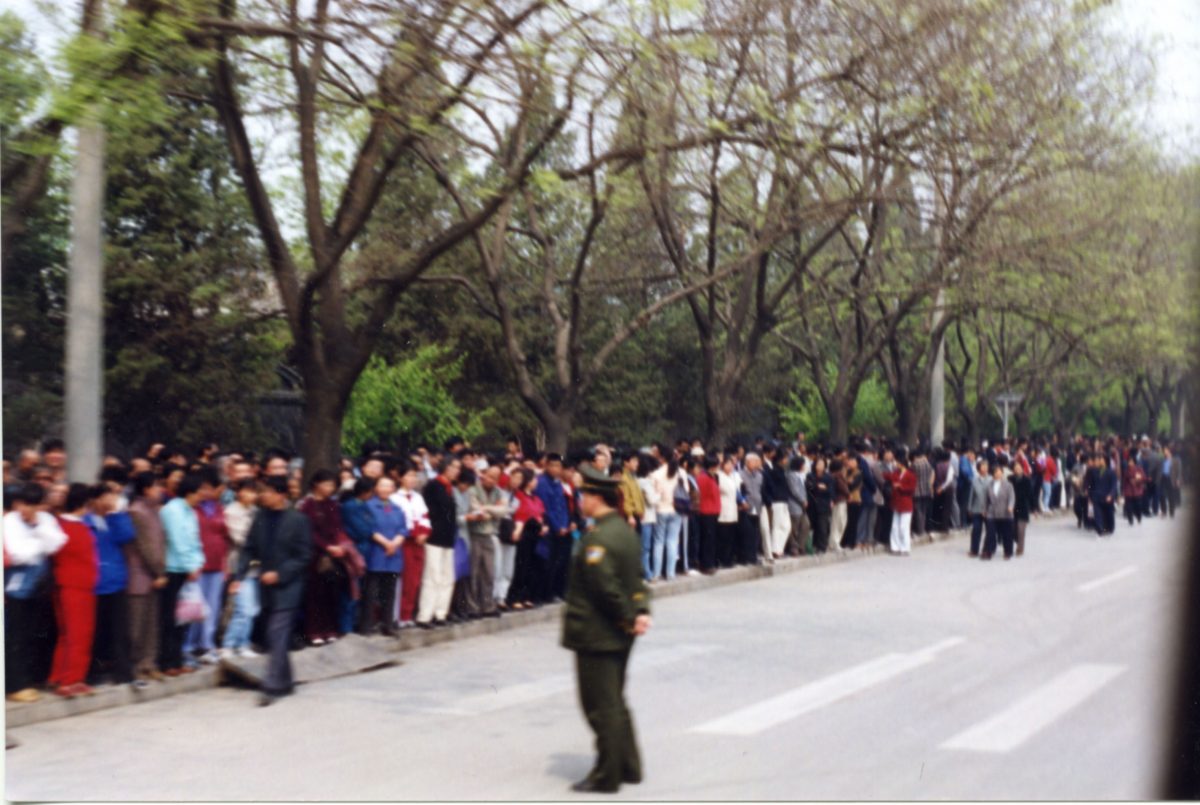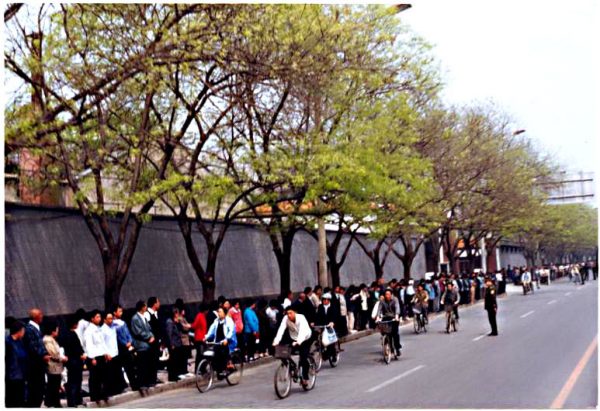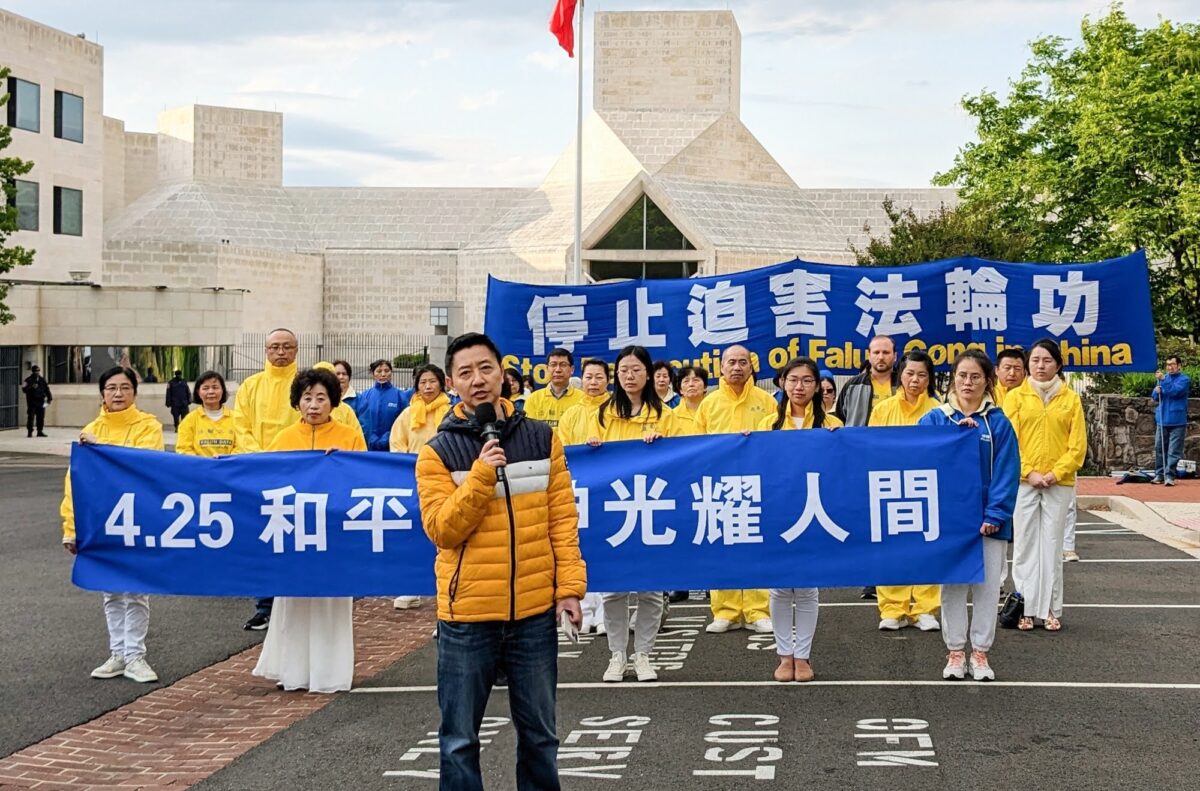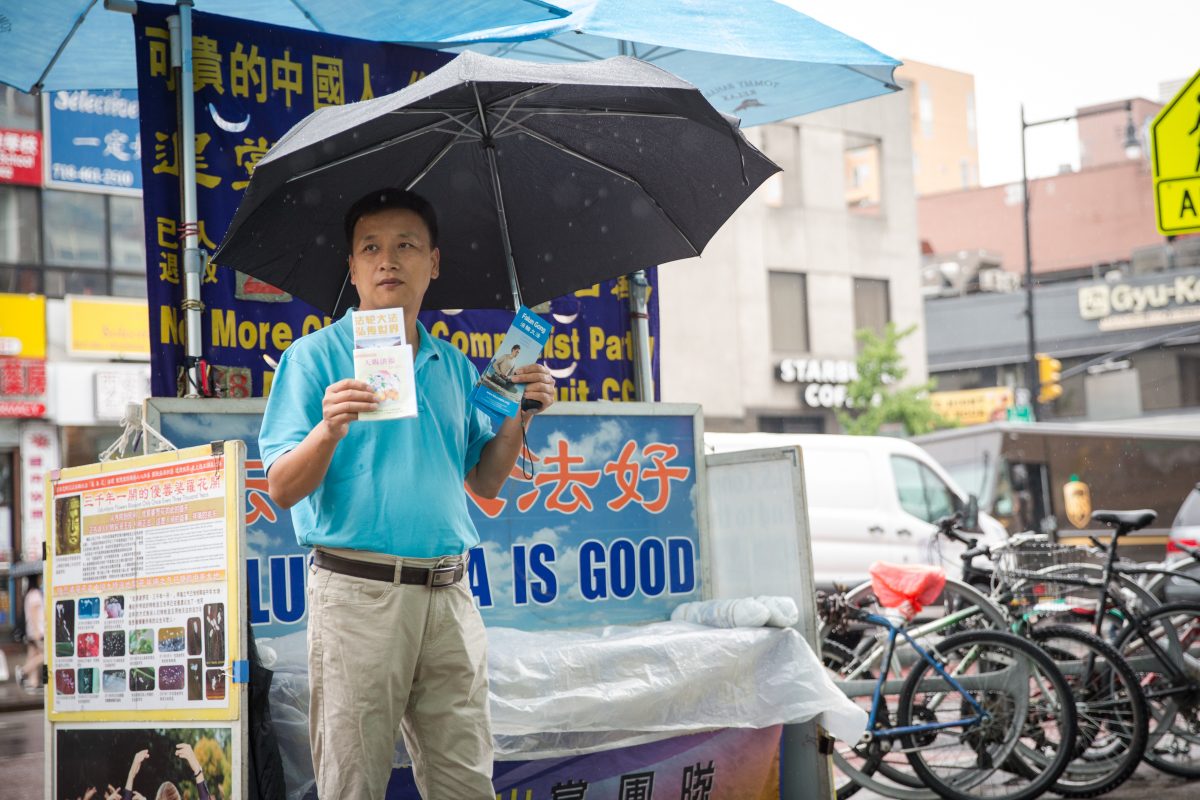


On the evening of April 24 more than two decades ago, Shao Changyong, a Falun Gong practitioner, went to his daily gathering with fellow adherents as usual.
His group had about 10 members, and one woman offered her home in Beijing as the meeting location. They usually read books of Falun Gong, a spiritual practice involving meditative exercises and moral teachings based on the tenets of truthfulness, compassion, and tolerance, which became popular with about 100 million adherents in China at the time.
Shao still remembers that evening.
“Let’s not study the book tonight. I have some news,” their host said, he recalled.
She informed the group of the idea of going to Zhongnanhai, the Chinese Communist Party’s (CCP’s) headquarters in the heart of Beijing, to demand the release of dozens of Falun Gong practitioners who had been detained in the megacity Tianjin.
In the months and years leading up to April 24, 1999, Falun Gong adherents felt growing restrictions on their freedoms. For about a week, adherents had peacefully protested a slanderous article published by Tianjin University’s School of Education. But in response, the city dispatched anti-riot forces on April 24 and arrested over 40 practitioners. Before the Tianjin incident, state-owned television and newspapers had run content vilifying the faith.
Tianjin is about 85 miles from Beijing and another city directly governed by central authorities. So the natural next step was to bring this matter to the CCP’s central bodies in the capital.
Shao said his first reaction was to speak to the CCP central committee to call for the Tianjin practitioners’ release.
But after he got home and began to prepare for the petition the next day, the pressure started building up.
Shao, 28 at the time, was an armed police officer teaching calculus at the Beijing Command Academy of People’s Armed Police (PAP), the CCP’s paramilitary wing. He knew the armed police force was supposed to be loyal to the Party. Visiting Zhongnanhai as a petitioner could mean losing his job. As a career military member who graduated from the Engineering University of the People’s Armed Police, losing his job meant losing his career and his family’s livelihood.
Shao had a vague thought in his mind that the next day would be a turning point in his life. He had thought that the consequence of his petition could happen as early as April 26, 1999: he might be pressed to the floor as soon as he entered the academy.
Despite the fear, he took a taxi to Zhongnanhai and arrived nearby around 5 a.m. on April 25.
When he crossed the street to get to his destination, a policeman was there to persuade Falun Gong practitioners not to continue. Shao said police knew what was happening, as some practitioners were already outside Zhongnanhai. The officer told people that they were “making a serious mistake.” When several responded that China’s constitution guaranteed freedom of belief, they were scoffed at.
“What is law?” said the officer, Shao recalled. “I’m the law.”
Shao knew the officer was telling the truth. From his professional knowledge, he could see plainclothes police officers in the crowd. Some even looked familiar to him.
At about 7 a.m., he went into a nearby alleyway for breakfast. When he had just finished eating, he heard some commotion in the crowd. His first reaction was: “Could this be a repeat of the 1989 Tiananmen Square Massacre?” After all, Tiananmen Square, where college students who asked for greater freedoms were killed by the CCP military a decade earlier, was within about a 10-minute driving distance.
Instead, he saw then-Premier Zhu Rongji greeting Falun Gong practitioners.
Shao recalled that a practitioner standing next to him was from northeastern China. That man said his only pursuit was to be able to freely practice his belief; he didn’t mind a meager life.
Being surrounded by fellow adherents calmed Shao down. More than 10,000 lined up outside the compound that day. The atmosphere, he recalled, was surprisingly tranquil. His mind became clear as the fear vaporized.
Later in the day, Zhu met a group of Falun Gong delegates and assured them of his support. The crowd of Falun Gong practitioners then dispersed. Shao got home at about 8 p.m. He had to work the next day.
Unlike his imagination, Shao wasn’t pressed to the floor when he went to work on Monday. Instead, the academy collected names of officers who practiced Falun Gong and those who joined the April 25 appeal. Then, several days later, the academy organized an all-hands meeting for a lecture by a professor of philosophy, who told them that the CCP central committee had decided to label Falun Gong as a heretical organization.
Then, in three months, the CCP launched nationwide persecution overnight on July 20, 1999.
Since then, millions of Falun Gong adherents have been held in labor camps, mental asylums, drug rehabilitation centers, unofficial black jails, or other detention facilities. The vilification, torture, and organized killing through forced organ harvesting arising from the persecution have led to an untold number of deaths. Those who survived are left with injuries and financial and psychological harms suffered from the ongoing abuses.
The persecution still continues to this day.
When the April 25 appeal occurred, He Bin, a software engineer and a Falun Gong practitioner, was a 31-year-old graduate student at the University of Maryland, College Park, majoring in telecommunications.
He recalled that there was no email list then, nor a main website to find out about news concerning Falun Gong. So he learned about the appeal during a weekly gathering with fellow practitioners when they usually read the main text of the practice “Zhuan Falun.”
He remembered that all were relieved that the petition was resolved peacefully.
When the CCP launched its persecution three months later, He was taken by surprise. Like other adherents, he began his journey of “truth-clarification”—a term used by Falun Gong practitioners for dispelling falsehoods about the practice disseminated by the CCP’s propaganda machine.
But clarifying the truth to Chinese people hasn’t been easy throughout the years, he said, because money is valued much more than freedom in modern Chinese society.
But after COVID hit, especially this year, he realized his efforts got easier. An awakening was happening in China triggered by recent events.
On Sunday, he shared his thoughts at a rally outside the Chinese Embassy in Washington. He said that back in 1999, petitioners went to Beijing to appeal over monetary issues such as lost retirement benefits, land disputes, or being forced to move out of their homes.
“However, the appeal of Falun Gong practitioners was for freedom of belief. It’s for people’s spiritual needs—a taboo in Chinese society.”
“Doing that required even more courage,” he said at the rally.
In a society ruled by the CCP, any petitions are usually met with retaliation. Considering the severe consequences, people would only resort to petitioning the CCP when they had hit rock bottom and had nothing to lose. And in a society where generations were brought up by communist education, people who risk their comfortable lives seeking freedom could easily be considered lunatics.
But things changed with the pandemic, and with the CCP’s draconian lockdown policies that saw hundreds of millions of citizens sealed inside their homes, on and off, for almost two years.
The result was a humanitarian catastrophe. Residents struggled to obtain basic food and supplies, grappled with the psychological toll of being trapped inside their homes for prolonged periods, and were denied access to medical care.
Then in November 2022, a deadly fire in a high-rise building in the capital of China’s western Xinjiang region, where some residents had lived under lockdown for more than 100 days, which took the lives of estimated dozens of residents became the spark that ignited nationwide protests.
Young protesters around the country held up blank pieces of paper and chanted slogans such as “End zero-COVID,” “We want human rights,” and “Down with the Communist Party!”
It was a bold display of defiance by the general populace not seen since the Tiananmen protests three decades ago.
Through his friends and family in China, He learned about the devastating effects of the CCP’s draconian lockdowns. China had truly become a society devoid of freedoms: on top of the absence of freedom of speech and belief, which has always been the case in communist China, people were now no longer able to live their normal lives nor move freely.
For He, the CCP’s heightened repression of the entire populace during the pandemic retroactively underscored the importance of the appeal in 1999.
The 10,000 adherents who went to Zhongnanhai were pioneers who stood up for what they believed in, He believes.
“Not many could take that step to go for a national-level petition for freedom of belief,” he told The Epoch Times, adding that many Falun Gong practitioners he knew in China decided not to go.
“It was a ‘no-brainer’ for those who went there, but it was not so straightforward for many others. Because doing that in China takes tremendous courage and faith.”
“The petition seemed to have failed because nationwide persecution was launched months later, but we tried,” he added.
“Falun Gong practitioners took the step when there was an opportunity for a fundamental direction change for Chinese society.”
Unfortunately, the CCP chose persecution.
Shao managed to escape China and arrive in the United States in 2015. Between 1999 and 2015, he lost his job and marriage, and suffered two years in a labor camp as a result of the persecution.
Nevertheless, he doesn’t regret joining the April 25 appeal.
“It is a highlight of my life,” Shao told The Epoch Times. “I’m honored to have joined the event. April 25, 1999, is a day I’m most proud of myself.”
Zhang Erping, a spokesperson for Falun Gong, also known as Falun Dafa, called the April 25 appeal “unprecedented” because “it was the first-ever peaceful action taken by Chinese civilians from all walks of life to seek freedom of expression, association, and conscience—these are rights articulated in China’s constitution.”
“Decades later, in the face of the CCP’s brutal persecution, Falun Dafa practitioners are still appealing in a peaceful manner for these rights,” he added.
“The courageous action is now widely supported and praised by many Chinese people because they are now recognizing that ‘4.25’ actually defended the basic human right of every Chinese citizen and, above all, defended the principles of Truth, Compassion, and Tolerance—the fundamental values of humanity.”
Greg Copley, president of the International Strategic Studies Association, spoke about the significance of the April 25 appeal in a recent interview with NTD, the sister media outlet of The Epoch Times.
“I think it is something that China watchers and the Falun Gong community itself need to memorialize and celebrate … to reduce, if you like, the message of that to something iconic.”
“Every society that succeeds has a saga of its society, a saga of heroism, of resistance, of nobility. And this canon should be one of the great symbols which permeates the Chinese people at home and abroad and should also inspire supporters of the Chinese people in their resistance,” he added.
“I think to do that, it’s worth writing the saga of that protest in such a way that it is seen as a milestone event in Chinese history, one which will spell the start of the decline of the Communist Party of China.”



